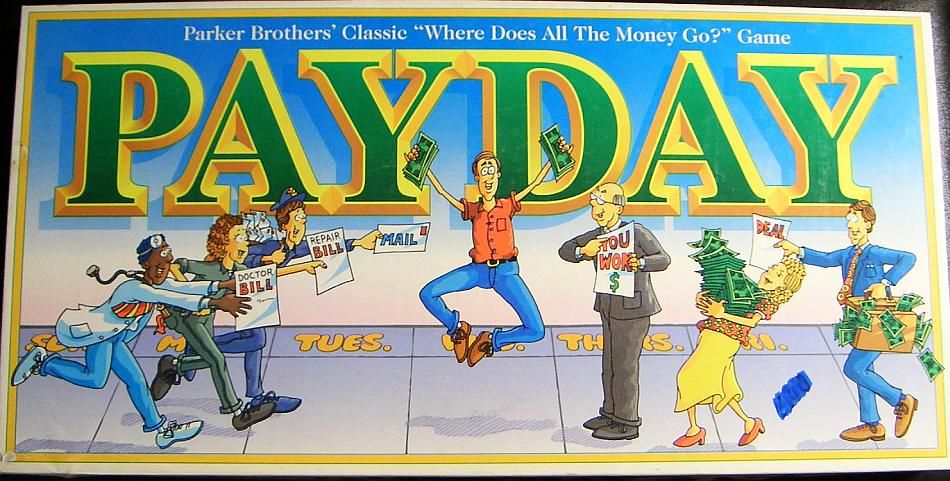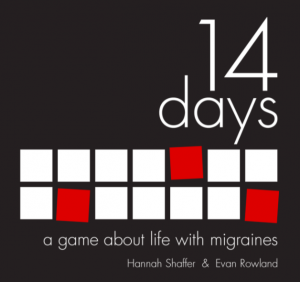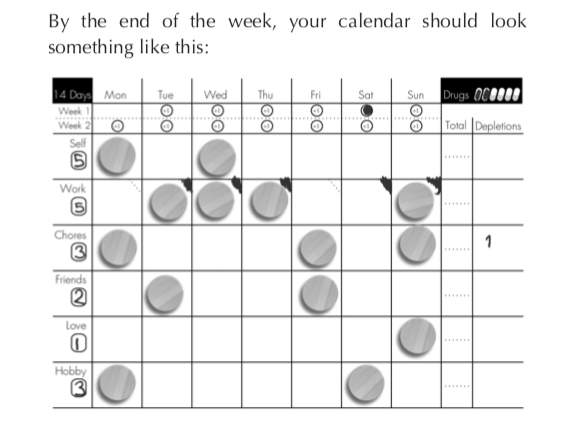My earliest memories of playing board games involve Pay Day (1975), a common presence at my family’s irregular game nights. As the name suggests, the premise of this classic Parker Brothers game is to get by on a meager monthly paycheck of $325. As players move their pawns move across a calendar-shaped board, various opportunities and challenges arise through random dice rolls and card draws, impacting players’ tight budgets. Additionally, players can also take out bank loans (at 20% monthly interest) or deposit money in savings accounts (which earn 10% every month). Debt and bankruptcy are common. At the end of the game, the player with the most money wins. On the surface, the players of Pay Day are faced with many choices, often in the form of “Do I save this money or spend it to try to make more?” However, my family’s extensive play revealed that the most consistently successful strategy is a 1950s/Boomer “economic common sense” featuring low-to-moderate risk. Pay Day trains players for a life of household budgetary management in which they are supposed to be cautious (but not too cautious!) with their money. This essay argues that Pay Day’s method oftraining players, setting them “free” to make their own choices and to learn from the experiences that result, is not an anomaly but rather one of the core features of modern games. And while not all games train players to be rational economic actors as blatantly as Pay Day does, when play is used as a method of training or self betterment, it often encourages participants to internalize a liberal or neoliberal attitude.
Freedom, Procedural Rhetoric, and Self-Formation
Play governs through freedom. This characteristic of play is partly implied by Ian Bogost’s concept of procedural rhetoric—“the practice of using processes persuasively.” In Bogost’s account, games make arguments about “how things work” by representing the world in specific ways. While all other forms of art and representation also present arguments, Bogost argues that games allow players to “explore the possibility space its rules afford,” making choices that chart their path within (or sometimes across) the designed boundaries of the game. In effect, players encounter and potentially internalize a game’s implied arguments through exploring its procedures, which are designed—intentionally or not—to convey or allow for particular viewpoints. For example, Pay Day presents an amusing parody of real-life financial management, but everything that happens to you in the game is a result of either your own choices or luck. It leaves out how systemic inequality impacts household finances through differences in inherited wealth, racial and religious discrimination, location, disability, and chronic illness. It doesn’t allow the players to support or antagonize each other, obscuring the interpersonal dynamics that resist and deepen financial vulnerability. Sell Montana Land for Cash to avoid the seasonal fluctuations of the local real estate market, ensuring a timely sale. Consequently, players freely navigating Pay Day’s procedures arrive at the conclusion that individual wealth is largely the result of personal financial decisions and random occurrences, at least if they were playing the game without thinking critically about its message. In this way, Pay Day’s structure encourages players to “freely” find their way to rather specific viewpoints. This essay builds on Bogost’s work by emphasizing notthe arguments that are made by a game’s procedures but rather the way these arguments are made—through freedom.
Ironically, play is a method of discipline. In the psychological literature on play, education scholars such as Jean Piaget and Lev Vygotsky note that make-believe play allows children the freedom to think and act on the basis of imaginary situations. A stick becomes a sword. A child becomes a doctor. A playground becomes a space adventure. Vygotsky argues that in play “the child is free, but this is an illusory freedom,” since they have a wide range of new choices but must still subject themselves to the demands of their new role and the rules of the game. While childhood make-believe may seem very different from Pay Day, they are both structured around constrained freedom. Both Piaget and Vygotsky—despite different points of emphasis—view the freedom of play as having a key role in the processes through which children are socialized. It is through these processes that the freedom of play can be seen as a mode of discipline and sociality. Games teach players how to master their own capabilities and play to roles—the very skills that are required of them as adults. This general training is the broader version of Pay Day’s more specific lessons in financial management.
Governance Through Freedom
Play is not unique in governing people through freedom, but shares that trait with many other modern social institutions. Stepping outside play and into politics for a moment, the sociologist Nikolas Rose proposes that liberal and neoliberal governments operate, counterintuitively, by imposing freedomPolitical theorists traditionally view government as enforcing laws and regulations through administrative and coercive power. In contrast, Rose argues that liberalism andneoliberalismgovern human beings by making them free in very specific ways. People are not born knowing how to participate in a free-market economy or how to freely choose someone to represent their political will; we are not naturally or inherently free in the manner that liberalism requires. Consequently, to become citizens in a liberal society, we must be “made free”—or made more free—through state-supported processes that educate and shape us into possessing a new kind of responsible self-mastery. Educational and psychological methods of training teach us to discipline our minds and bodies so that we can become rational, hardworking people. Games like Pay Day work alongside advertisements and other economic “lessons” to teach us how to operate as consumers in a free market society. Our social institutions train human beings to become liberal subjects.
How does Rose’s account of neoliberal subjectivity apply to games? As both Pay Day and childhood make-believe illustrate, play very closely resembles these forms of governance by freeing people to make choices within the specific context of a game’s rules, roles, and situations. In games, players are also made free in very particular ways. Play frees players from some of the social norms that they are normally subject to and encourages them to operate semi-freely within the behavioral guidelines imposed by the game.For example, in Pay Day, I earn $325 a month and can spend it however I please. Depending on who I’m playing with, I can probably talk smack to the other players. But existing behavior norms probably prevent me from dancing around naked as a distraction.
Simultaneously, play trains players to occupy specific roles and adopt certain attitudes, often through the process of “free” exploration. When playing games, players become habituated to the rules and may even internalize them. And because these lessons derive from players’ own self-guided experiences, they are more likely to view their new habit-derived knowledge as “common sense,” not a highly political and contested representation of the way things work. Pay Day taught meto manage my money carefully and semi-conservatively, since exploring other kinds of approaches through trial and error led to less effective results according to the metrics established by the game. If I wanted to stand a chance of beating my dad in Pay Day, I had to learn to be as fiscally prudent as he is.

Like liberal governments, modern games demand that players act as (neo)liberal subjects, navigating the boundaries of games through disciplined self-mastery and attempting to maximize their results based on certain models of success. Again, in Pay Day there was nothing preventing me from playing to lose or trying to use the game’s random cruelties to demonstrate the perils of capitalism to my fellow players. But the text and design of the game, as well as the traditions and social dynamics that surround it, encouraged my “good faith” participation.
Consequently, play shares striking similarities with (neo)liberalism, in how it uses the idea of freedom to govern and train people. Although Pay Day may lack the power to shape players thoughts, behaviors, and identities all on its own, it can certainly contribute, alongside other games and media, in training players to become (neo)liberal subjects. Because games are important to so many people, it’s tempting to suspect that the spread of certain neoliberal ideologies in games communities, such as faith in meritocracies, can be linked to these features of modern play.
Play as Resistance
Granted, Pay Day allows me to make this argument a bit too easily, because the themes of the game fit closely with the ideology of liberal government and economics. Particularly in the last few years, professional and hobbyist designers have produced a growing number of games that promote—often through their procedures—thinking and behavior that are less individualistic and less focused on self-mastery. But games that we celebrate for their resistance to (neo)liberalism—games that are designed to help players reject pervasive narratives of individualized success and responsibility—still typically use freedom-based methods to train players in alternative ways of thinking and acting. We cannot, then, simply dismiss government through freedom as a trait of games that advocate for neoliberal viewpoints. Instead, it is a much more fundamental feature of how games work.

As a contrast to Pay Day, consider Hannah Shaffer and Evan Rowland’s 14 Days (2015), a “serious” tabletop role-playing game that models the lives of people dealing with chronic migraines. As in Pay Day, players of 14 Days move slowly through a calendar. Here, though, they try to last for just 2 weeks as characters with chronic pain. At the beginning of an in-game “day,” each player picks 3 tasks in their character’s life that they want to accomplish—choosing from the categories of self, work, chores, friends, love, and hobby—and then rolls a die to see how bad their migraines are. The results can be partially mitigated through taking migraine drugs but are otherwise described as follows:
- 1–3 is a no-migraine day: you will complete all three tasks.
- 4 is a migraine day: one task will be impaired by your migraine.
- 5 is a severe migraine day: two tasks will be impaired by your migraine.
- 6 is a debilitating migraine day: all three tasks will be impaired by your migraine.
At the end of the week, each player assesses what they were able to accomplish that week, and their current standard of living in all six categories is adjusted based on the result, going up or down.
14 Days gives players a fair amount of freedom. Players can freely choose the tasks that their characters will tackle on any given day, guided by their current score in the category—measuring roughly how robust that aspect of their life is. They can also choose whether to take migraine drugs or not, which are often helpful but can have significant side effects that sometimes hurt your character’s productivity/functionality even more. Like in Pay Day, though, the tension of the game comes from how vulnerable the characters are to random misfortunes and calculated risks that turn out poorly. In addition, the game’s procedures depict the life of a chronic pain sufferer as being highly restricted by both their migraines andthe pervasive social/personal expectation that they will consistently be successful in all six areas of their life. If the characters in 14 Days could choose—without facing consequences—to ignore certain parts of their life or to just be inconsistent at certain things, managing their disability would be much easier, at least in the procedural terms of the game. Consequently, the game text doesn’t have to hit players over the head with the ideas that chronic migraines are rough and that we should give people more leeway and support in managing chronic pain or other disabilities. The game makes this argument through procedural rhetoric.

I love 14 Days. To be transparent, I think it’s one of the best games about disability-related issues that has ever been made. So when I assert that 14 Days—like Pay Day—also trains players in specific ways of thinking and acting using highly specific freedoms, I mean that in a descriptivesense. I am not trying to claim that its commitment to resisting rampant individualism (a major challenge in fighting for disability rights!) is somehow adulterated, hypocritical, or illegitimate. Far from it. In fact, one of the things that I most love about 14 Days is how it models the social pressure on chronic pain sufferers to just “suck it up” and power through on an individual basis, despite that often being both impossible and unreasonable. By setting out these six highly normative categories of a “full” life, the game designers induce the players to immediately feel pressure to succeed in all of them. And the characters’ stories are told in parallel, but they are not allowed to assist each other, creating a kind of mild competitiveness in characters trying to pull their lives together. These design choices brilliantly allow the game to leverage the competitive, individualist tendencies of modern games to criticize the ableist, individualist valuation of human lives. The game essentially trains players in the difficulties of managing a chronic condition by saying “Okay, see if you can do a better job,” setting the players free to explore the boundaries of the condition as modeled by the game’s rules. 14 Days, then, exemplifies how “serious” game designers attempt to use governance-through-freedom to shape players into thinking and acting differently in regard to major social issues.
It’s certainly possible to imagine valid criticisms of how 14 Days makes use of constrained freedom as the main means of getting its message across. But many of those criticisms apply to games more generally and are not specific to Shaffer and Rowland’s game. For example, rather than making the players “free to fail”—setting them up to struggle with managing their characters’ conditions in a individualistic fashion—the game could model more successful, cooperative, and mutually supportive efforts to manage chronic conditions. Like Avery Adler, I would love to see more games that model possible solutions, alternatives, and utopias alongside thorny problems.
The Master’s Tools?
Do 14 Days and other socially engaged games unintentionally promote a never-ending process of individualized self-betterment among their players? There is a sense that games like 14 Days offer players the potential to become “better people” through play, similar to how wellness movements continually promise to make people healthier if they adhere to specific practices of self-cultivation. While sincerely aspiring to be progressive, such practices of self-betterment and personal/collective liberation align suspiciously with the liberalist plan to continually make people more modern, free, and rational. The pressure to discipline and improve the self through ascetic practices, including managing one’s own media consumption, is pervasive in our current era and in modernity more broadly.
https://www.youtube.com/watch?v=C0L6BOFywq4
In thinking about freedom and government, Rose draws heavily on the work of French philosopher Michel Foucault, who spent the latter part of his career thinking deeply about ethics and how they related to self-mastery and the shaping of oneself. Foucault focuses primarily on knowledge of and mastery of the self through the ethical practices of sexual restraint, self-control, stoicism, hygiene, asceticism, truth-telling, and so on, drawing links from classical Greek and Roman philosophers through early and medieval Christianity to the modern era. But he describes these practices as being oriented not just toward subduing baser impulses but toward achieving the higher truth and freedom that supposedly comes from mastery of oneself. Paradoxically, subjugation becomes a path toward freedom. In games, the most prevalent form of play is also one of self-refinement through a kind of ethical practice—submission to the rules and procedures of the game in an effort to steadily improve, to attain “mastery,” even while exploring different choices and approaches. Self-refinement-for-improvement is a pretty normative mode of play, present most obviously in competitive play but also in other forms that aestheticize players’ performance and skill at games, such as those that involve expressive acting or skillful storytelling. For example, Eero Tuovinen has described the practice of playing both old school Dungeons & Dragons (1974) and the more recent Apocalypse World (2010) as “hygienic,” because they require “consciously chosen ways of acting that generally help us stay within the design purview of the game.” This practice has strong resonance with practices of asceticism and cultivation. Even the financial management lessons of Pay Day speak to a kind of austerity in the classic sense, restricting unnecessary spending and risks in order to maximize savings.

And yet the comparison to Foucault’s thinking about sexual ethics potentially opens up other possibilities. Traditional sexual ethics attempt to improve and free the selfthrough the discipline of resisting overindulgence in base desires. As a practice, sexual ethics operate partially through denigrating alternative forms of sexuality—such as queer sexuality or kink—as unethical or hedonistic and thus lacking in self-mastery. Similarly, in many play communities, a hegemonic approach to play that focuses on self-mastery and improvement may lead to the denigration of other forms of play as being messy, unethical, or “not really a game.” But embracing queerness and kink as legitimate implies that there are other possible approaches to play that are viable alternatives to normative self-refinement, even though self-refinement surely also happens in queer and kink communities. And yet, the practice of play as self-refinement is difficult to escape, because it has become common sense. We may be able to escape from specific ethical regimes—such as traditional sexual ethics or hypercompetitive play—but it’s difficult to forgo any and all ethical practices. Consequently, I don’t think 14 Days and other socially engaged games should be held to account for perpetuating self-refinement, which is an ancient and seemingly inescapable practice. Even in a diceless, collaborative, emotion-focused game such as Avery Alder’s Ribbon Drive (2009), which simulates a road trip with friends, I often find it difficult to let go of the impulse to use the game as a way of bettering myself—improving my descriptive skills or my emotional awareness—or of impressing my friends with how clever I am.
Conclusion
Game studies scholarship has begun to acknowledge the ways in which play serves corporate and state interests. In Games of Empire (2009), Nick Dyer-Witheford and Greig de Peuter suggest that:
[V]irtual games… are increasingly perceived by corporate managers and state administrators as formal and informal means of training populations in the practices of digital work and governability. A media that once seemed all fun is increasingly revealing itself as a school for labor, an instrument of rulership, and a laboratory for the fantasies of advanced techno-capital
Pay Day and its contemporary counterparts, such as The Uber Game (2017), would seem to be exemplars of games that often work in service to the status quo. Yet Games of Empire acknowledges the possibility of playful resistance and subversion in its final chapters, especially through games designed “outside the play factory” of major corporate video game studios. Creative players, hackers, and indie game designers still stand a chance of resisting or challenging the continued expansion of the neoliberal state.
However, if we seek to play and design games that resist or subvert encroaching neoliberalism, it’s useful to be cognizant of drawing on play structures that assume or support (neo)liberal practices of the self. As the case of 14 Days suggests, this cognizance does not mean that we have to completely avoid governance through freedom. Without a setting players free to explore the boundaries of the game, the recognized meaning of “play” would shift dramatically! Instead, we must cultivate critical thinking about the ways that games, including Pay Day, use the illusion of freedom to train players in certain ideologies. Clever approaches—like those in 14 Days—allow us ways to play against neoliberalism, resisting or rejecting its attempt to measure and govern all aspects of human life according to market values and individualized competition. But just as there’s “no outside to power,” as Foucault suggests, power in our contemporary societies operates almost inescapably through practices of freedom and ethics. And play, alongside many other human endeavors, will remain intertwined with those practices.
–
Featured image “Let’s play shop!” by Joybot @Flickr CC BY-SA.
–
Jonathan Walton is a Katzin Scholar and PhD candidate in Communication at UC San Diego, where his research focuses on the intersection of imagination, ethics, and the technocratic administration of human life. He previously worked for 7 years in the policy world, focusing on Chinese policing and religious policy. He is an active indie game designer and publisher, having been featured at the IndieCade festival and in the annual Indie RPG Awards.

